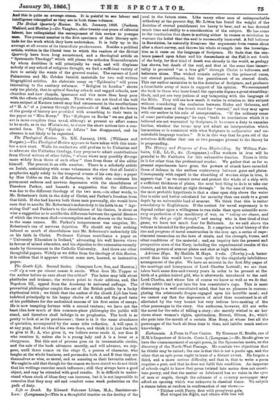The Gentle Life. Second Series. (Sampson Low, Son, and Marston.)
—// n'y a men qui reusstt comme le succes. What does Mr. Tupper or the author before us care about the critics? The latter may talk about platitudes and truisms ; the writers point to their editions, and, like Napoleon III., appeal from the Academy to universal suffrage. The proverbial philosopher caught the ear of the British public by a lucky rhythmical trick ; we think that the author of the Gentle Life has been indebted principally to his happy choice of a title and the good taste of his publishers for the undoubted success of his first series of essays. He is now tempting fortune with a second venture ; we have not the
least idea how much of this common-place philosophy the publie will stand, and therefore shall indulge in no prophecies. The book is as pretty to look at as its predecessor ; there is in it the same abundance of quotation, accompanied by the same trite reflection. A will open it at any page, find an idea of his own there, and think it is just the book to give to B; A, who gives it, we believe never reads it, nor does B who receives it, unless she is a young lady and A is a lover or a clergyman. But this sort of process goes on in innumerable circles, and the sale of the book advances merrily, and will advance, we sup-
pose, until there comas on the stage C, a person of character, *rho laughs at the whole business, and persuades both A and B that they are
themselves as wise, as moral, and as amusing as their favourite author.
We ought to add that though for the reason we have stated we do not think that his writings exercise much influence ; still they always have a good object, and may be attended with good results. It is difficult to under- stand whose stock of ideas they can increase, but it is not impossible to conceive that they may aid and comfort some weak pedestrian on the path of duty.






























 Previous page
Previous page